Related Research Articles
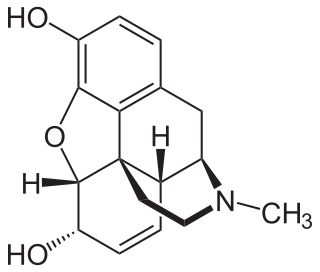
Morphine is a strong opiate that is found naturally in opium, a dark brown resin in poppies. It is mainly used as a pain medication, and is also commonly used recreationally, or to make other illicit opioids. There are numerous methods used to administer morphine: oral; sublingual; via inhalation; injection into a muscle; by injection under the skin; intravenously; injection into the space around the spinal cord; transdermal; or via rectal suppository. It acts directly on the central nervous system (CNS) to induce analgesia and alter perception and emotional response to pain. Physical and psychological dependence and tolerance may develop with repeated administration. It can be taken for both acute pain and chronic pain and is frequently used for pain from myocardial infarction, kidney stones, and during labor. Its maximum effect is reached after about 20 minutes when administered intravenously and 60 minutes when administered by mouth, while the duration of its effect is 3–7 hours. Long-acting formulations of morphine are available as MS-Contin, Kadian, and other brand names as well as generically.

Opium is dried latex obtained from the seed capsules of the opium poppy Papaver somniferum. Approximately 12 percent of opium is made up of the analgesic alkaloid morphine, which is processed chemically to produce heroin and other synthetic opioids for medicinal use and for the illegal drug trade. The latex also contains the closely related opiates codeine and thebaine, and non-analgesic alkaloids such as papaverine and noscapine. The traditional, labor-intensive method of obtaining the latex is to scratch ("score") the immature seed pods (fruits) by hand; the latex leaks out and dries to a sticky yellowish residue that is later scraped off and dehydrated. The word meconium historically referred to related, weaker preparations made from other parts of the opium poppy or different species of poppies.

Thebaine (paramorphine), also known as codeine methyl enol ether, is an opiate alkaloid, its name coming from the Greek Θῆβαι, Thēbai (Thebes), an ancient city in Upper Egypt. A minor constituent of opium, thebaine is chemically similar to both morphine and codeine, but has stimulatory rather than depressant effects. At high doses, it causes convulsions similar to strychnine poisoning. The synthetic enantiomer (+)-thebaine does show analgesic effects apparently mediated through opioid receptors, unlike the inactive natural enantiomer (−)-thebaine. While thebaine is not used therapeutically, it is the main alkaloid extracted from Papaver bracteatum and can be converted industrially into a variety of compounds, including hydrocodone, hydromorphone, oxycodone, oxymorphone, nalbuphine, naloxone, naltrexone, buprenorphine, butorphanol and etorphine.

The term narcotic originally referred medically to any psychoactive compound with numbing or paralyzing properties. In the United States, it has since become associated with opiates and opioids, commonly morphine and heroin, as well as derivatives of many of the compounds found within raw opium latex. The primary three are morphine, codeine, and thebaine.

Laudanum is a tincture of opium containing approximately 10% powdered opium by weight. Laudanum is prepared by dissolving extracts from the opium poppy in alcohol (ethanol).

A poppy is a flowering plant in the subfamily Papaveroideae of the family Papaveraceae. Poppies are herbaceous plants, often grown for their colourful flowers. One species of poppy, Papaver somniferum, is the source of the narcotic drug opium which contains powerful medicinal alkaloids such as morphine and has been used since ancient times as an analgesic and narcotic medicinal and recreational drug. It also produces edible seeds. Following the trench warfare in the poppy fields of Flanders, Belgium during World War I, poppies have become a symbol of remembrance of soldiers who have died during wartime, especially in the UK, US, and Canada.

Opioids are substances that act on opioid receptors to produce morphine-like effects. Medically they are primarily used for pain relief, including anesthesia. Other medical uses include suppression of diarrhea, replacement therapy for opioid use disorder, reversing opioid overdose, and suppressing cough. Extremely potent opioids such as carfentanil are approved only for veterinary use. Opioids are also frequently used non-medically for their euphoric effects or to prevent withdrawal. Opioids can cause death and have been used for executions in the United States.

Papaver somniferum, commonly known as the opium poppy or breadseed poppy, is a species of flowering plant in the family Papaveraceae. It is the species of plant from which both opium and poppy seeds are derived and is also a valuable ornamental plant, grown in gardens. Its native range is probably the eastern Mediterranean, but is now obscured by ancient introductions and cultivation, being naturalized across much of Europe and Asia.
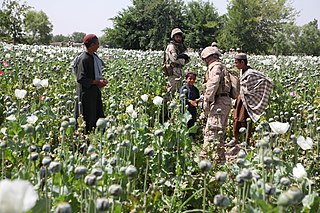
The Single Convention on Narcotic Drugs, 1961 is an international treaty that controls activities of specific narcotic drugs and lays down a system of regulations for their medical and scientific uses; it also establishes the International Narcotics Control Board.

Poppy tea is a herbal tea infusion brewed from poppy straw or seeds of several species of poppy. The species most commonly used for this purpose is Papaver somniferum, which produces opium as a natural defense against predators. In the live flower, opium is released when the surface of the bulb, called the seed pod, is pierced or scraped. For the purpose of the tea, dried pods are more commonly used than the pods of the live flower. The walls of the dried pods contain opiate alkaloids, primarily consisting of morphine.
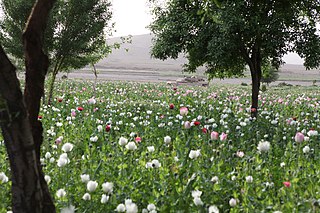
Afghanistan has long had a history of opium poppy cultivation and harvest. As of 2021, Afghanistan's harvest produces more than 90% of illicit heroin globally, and more than 95% of the European supply. More land is used for opium in Afghanistan than is used for coca cultivation in Latin America. The country has been the world's leading illicit drug producer since 2001. In 2007, 93% of the non-pharmaceutical-grade opiates on the world market originated in Afghanistan. By 2019 Afghanistan still produced about 84% of the world market. This amounts to an export value of about US$4 billion, with a quarter being earned by opium farmers and the rest going to district officials, insurgents, warlords, and drug traffickers. In the seven years (1994–2000) prior to a Taliban opium ban, the Afghan farmers' share of gross income from opium was divided among 200,000 families. As of 2017, opium production provides about 400,000 jobs in Afghanistan, more than the Afghan National Security Forces. In addition to opium, Afghanistan is also the world's leading producer of hashish.
Pantopon, also known as Opium Alkaloids Hydrochlorides, is a preparation of opiates made up of all of the alkaloids present in opium in their natural proportions as hydrochlorides salts. It can sometimes be tolerated by people who are allergic to morphine.
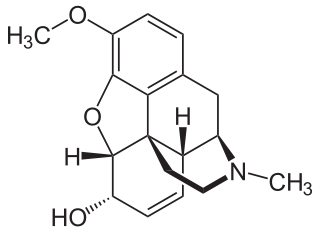
Codeine is an opiate and prodrug of morphine mainly used to treat pain, coughing, and diarrhea. It is also commonly used as a recreational drug. It is found naturally in the sap of the opium poppy, Papaver somniferum. It is typically used to treat mild to moderate degrees of pain. Greater benefit may occur when combined with paracetamol (acetaminophen) or a nonsteroidal anti-inflammatory drug (NSAID) such as aspirin or ibuprofen. Evidence does not support its use for acute cough suppression in children or adults. In Europe, it is not recommended as a cough medicine in those under 12 years of age. It is generally taken by mouth. It typically starts working after half an hour, with maximum effect at two hours. Its effects last for about four to six hours. Codeine exhibits abuse potential similar to other opioid medications.

Narcotoline is an opiate alkaloid chemically related to noscapine. It binds to the same receptors in the brain as noscapine to act as an antitussive, and has also been used in tissue culture media.
The Government Opium and Alkaloid Factories (GOAF) is an Indian government-owned organisation. Its headquarter is located in New Delhi. The overall supervision of the organisation comes under the purview of Department of Revenue, Ministry of Finance. There are two factories under this organisation - Government Opium and Alkaloid Works, Ghazipur (U.P.) and Government Opium and Alkaloid Works, Neemuch (M.P.).
Legal cultivation of opium for medicinal purposes is carried out in India, only in selected areas, under free licensing conditions. India is the world's largest manufacturer of legal opium for the pharmaceutical industry according to the CIA World Factbook. India is one among 12 countries in world where legal cultivation for medical use is permissible within the ambit of United Nations, Single Convention on Narcotic Drugs 1961. In India legal cultivation is done primarily in Madhya Pradesh, Rajasthan and Uttar Pradesh. Despite producing poppy for opium production India depends heavily on imports to meet need of Poppy seed for edible purposes and domestic Codeine demand for medical purposes . Opium is heavily imported from its top producing nations like Afghanistan. There is also an account of Opium black marketing in India.

Poppy straw is derived from opium poppies that are harvested when fully mature and dried by mechanical means, minus the ripe poppy seeds. Opium poppy straw today can be one of several different things. It is what remains after the poppy seed harvest, that is, the dried stalks, stem and leaves of poppies grown for their seeds. The dried leaves and stalks are harvested after the seed pods have been used for traditional opium extraction. The field dried leaves, stalk and seed pod are used in commercial manufacture of morphine or other poppy alkaloid derived drugs, by first processing the material to make poppy straw separating the seeds then making concentrate of poppy straw, where no extraction using traditional methods of latex extraction has been made. The straw was originally considered an agricultural by-product of the mechanised poppy seed harvest, which was primarily grown for its edible and oil-producing seed. This changed in 1927 when János Kabay developed a chemical process to extract morphine from the crushed capsule. Concentrated poppy straw consisting mainly of the crushed capsule without the seeds soon became a valuable source of morphine. Today, concentrate of poppy straw is a major source of many opiates and other alkaloids. It is the source of 90% of the world supply of legal morphine and in some countries it also is a source of illegal morphine, which could be processed into illegal heroin.
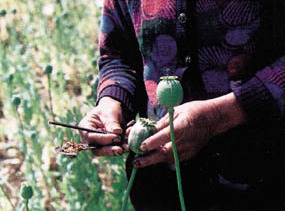
An opiate, in classical pharmacology, is a substance derived from opium. In more modern usage, the term opioid is used to designate all substances, both natural and synthetic, that bind to opioid receptors in the brain. Opiates are alkaloid compounds naturally found in the Papaver somniferum plant Papaver somniferum. The psychoactive compounds found in the opium plant include morphine, codeine, and thebaine. Opiates have long been used for a variety of medical conditions with evidence of opiate trade and use for pain relief as early as the eighth century AD. Opiates are considered drugs with moderate to high abuse potential and are listed on various "Substance-Control Schedules" under the Uniform Controlled Substances Act of the United States of America.

MacFarlan Smith is a pharmaceutical research company based in Edinburgh, Scotland, founded in 1815. It is part of the Fine Chemical and Catalysts division of Johnson Matthey.

The Tasmanian opium poppy farming industry was established in Tasmania in 1966.
References
- ↑ Ogilvie, Felicity (25 June 2009). "Happy hops damage poppy crops". Australian Broadcasting Corporation.
- ↑ Young, Emma (15 November 2004). "Morphine-free poppies could help fight malaria". New Scientist.
- ↑ "Tasmania opium-poppy crop about ready". The Washington Times. 18 February 1994.
- 1 2 International Narcotics Control Board (1981). "Demand and supply of opiates for medical and scientific needs: report of the International Narcotics Control Board for 1980" (16). United Nations: 162, 164.
{{cite journal}}: Cite journal requires|journal=(help) - ↑ Robinette, Glenn (2008). Did Lin Zexu Make Morphine. Graffiti Militante Press. p. 227. ISBN 978-0-9820787-2-3.